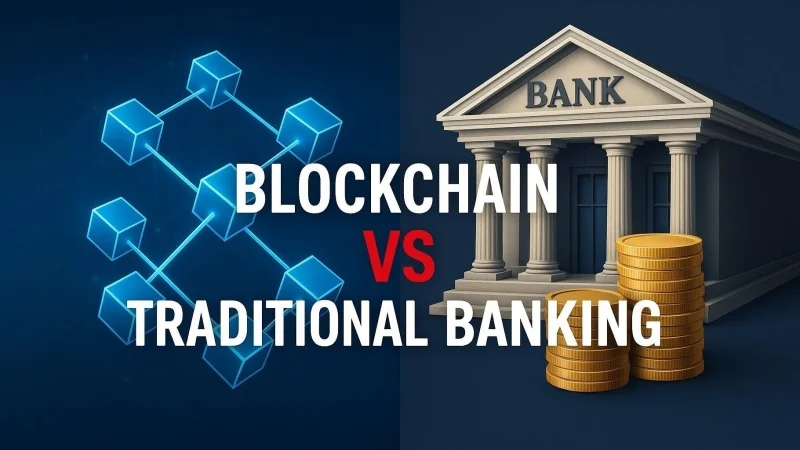Blockchain vs Traditional Banking | A Modern Debate

The world of finance is being turned upside down. On one side, we have the traditional banking system that has been the foundation of global finance for centuries. On the other hand, we see blockchain technology as a new age disruptor that continually challenges traditional protocols with its angle on decentralization, transparency, and speed.
This isn’t a theoretical conversation any longer, it’s dictating how money flows, how business gets done and how people manage their own assets. Recently, at Wadeetech HUB, Jebran Hamza shared an insightful story. For the reader who needs to take a fresh look, for the reader who wants to know what’s really at stake, this debate matters deeply.
Traditional Banking – Stability at a Price
Legacy banks are centralized systems. They serve as honest brokers, storing deposits, lending out money and providing methods to pay. Strong government controls, deposit insurance and the long history of banks provide confidence in this system.
But the model is far from perfect:
- Sluggish processes: Transfers between international banks can require days.
- High cost: Numerous intermediaries charge fees on nearly every transaction.
- Transparency: Transactions are recorded in the public ledger.
Banks offer the stability and consumer safety features that many take for granted, but they also come with inefficiencies that many think are ill-suited to today’s fast-paced digital economy.
Blockchain – The Disruptive Alternative
Blockchain turns the model on its head with a decentralized, peer-to-peer system. Rather than being verified by banks, the blockchain method is self-regulating with a network of computers (nodes) verifying and recording transactions on an unhackable public ledger.
Its standout features include:
- Speed: Moves are settled in minutes, not days.
- Lower costs: Middlemen are eliminated, and transaction fees decrease.
- Transparency: All transactions are open to all in a public ledger.
- Security: With advanced cryptography, vulnerability to fraud is minimized.
What really makes blockchain special is that it doesn’t simply copy what banks do — it opens up new possibilities, from cryptocurrencies to smart contracts.
What is Blockchain Actually Useful For?
More broadly, blockchain has transformed from an abstract curiosity to a technology with direct applications across the global economy.
- Cross-Border Payments: Banks and fintech companies are leveraging blockchain to reduce the time it takes for a global money transfer to go through, in addition to cutting down its costs.
- Smart contracts: Automatically executing agreements when their requirements are satisfied.
- Identity: Preventing fraud by securing user identities.
- Asset Tokenization: Transforming property, stocks, or art into tradable digital tokens.
- That’s why the world’s top financial institutions are investing in blockchain research — it is no longer just a ‘cool experiment’ but a much-needed upgrade to those core elements of economic infrastructure.
Blockchain vs Banks – The Good and The Bad
Like traditional banking, blockchain technology comes with both advantages and disadvantages.
Blockchain Strengths:
- Speed and efficiency
- Transparency
- Reduced fees
- Security through immutability
Blockchain Weaknesses:
- Scalability issues under heavy load
- Lack of consistent regulation worldwide
- Energy consumption in some models
- Poorly coded smart contracts can be risky
Banks, conversely, do provide trust; they have the legitimacy of being backed by law and consumer protection behind them, but they cannot compete on speed, nor can they compete on costs and flexibility.
The Hybrid Future of Finance
Will blockchain replace banks? Not just yet, experts said. Instead, the future is likely to be a hybrid, where banks adopt blockchain for efficiency while continuing to deliver trust, compliance, and protection to consumers.
For example:
- Banks may turn to blockchain for cross-border payments.
- Regulators can impose blockchain-enabled digital identities.
- Consumers could benefit from quicker, more affordable services without sacrificing legal protections.
- That combination could fuse the security of banking with the innovation of blockchain.
Why This Debate Matters
The conversation about Blockchain vs Traditional Banking isn’t merely academic, it affects businesses, consumers and regulators.
- For businesses, blockchain reduces operational costs and speeds up trade.
- For consumers, it offers financial inclusion and quicker transactions.
- For policymakers, it raises new challenges of juggling innovation with stability.
The future financial system will not be “banks vs blockchain,” but banks with blockchain.
Want to read the full deep dive? Click here!
Ti potrebbe interessare:
Segui guruhitech su:
- Google News: bit.ly/gurugooglenews
- Telegram: t.me/guruhitech
- X (Twitter): x.com/guruhitech1
- Bluesky: bsky.app/profile/guruhitech.bsky.social
- GETTR: gettr.com/user/guruhitech
- Rumble: rumble.com/user/guruhitech
- VKontakte: vk.com/guruhitech
- MeWe: mewe.com/i/guruhitech
- Skype: live:.cid.d4cf3836b772da8a
- WhatsApp: bit.ly/whatsappguruhitech
Esprimi il tuo parere!
Ti è stato utile questo articolo? Lascia un commento nell’apposita sezione che trovi più in basso e se ti va, iscriviti alla newsletter.
Per qualsiasi domanda, informazione o assistenza nel mondo della tecnologia, puoi inviare una email all’indirizzo guruhitech@yahoo.com.
Scopri di più da GuruHiTech
Abbonati per ricevere gli ultimi articoli inviati alla tua e-mail.
